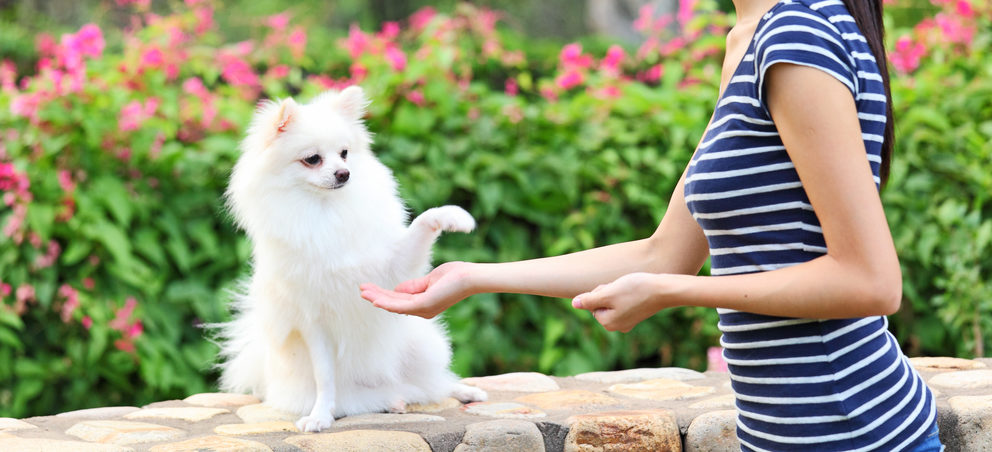The doorbell rang. We usually get our dogs out of the way before letting people in, so my husband, Tim, called out “Rosie, Place!” as he headed to the front door. Rosie sped to the bedroom, whipped around and held position at the open doorway. As Tim greeted our guests, Rosie waited until she heard her release cue, “Okay,” before dashing out to say hello. Rosie is a 4-pound Yorkshire Terrier.
I can’t tell you how many times I’ve heard you can’t train Yorkshire Terriers. Or Chihuahuas. Or fill-in-the-blank any small-breed dog. It’s just not true.
Did you know that small-breed dogs can be service dogs? I mean legitimate service dogs, not props that people carry around and try to pass off as working dogs. I’ve known Papillons who pulled clothes out of the dryer, helped tug bedsheets in place, retrieved dropped objects, and pressed elevator buttons for their owners with disabilities. I know small dogs who are excellent hearing-assistance dogs, alerting their people when the doorbell, oven timer, or smoke alarm goes off. These skills require high standards of training.
Small dogs can make excellent therapy dogs, which also requires specialized training. My 10-pound Papillon, Finian, is a retired registered therapy dog. During his career he visited nursing homes, hospitals, and schools. Little dogs compete in obedience, rally, barn hunt, agility, nose work, and many other sports, winning titles and the accompanying bragging rights.
The Small Dog Challenge
Tiny dogs are extremely trainable. If you follow modern, reward-based training based in science, the principles apply no matter a dog’s size. (Or species, for that matter. You can train an alligator to come when called. If that’s the case, you can certainly train a Chihuahua!) You just need to understand how to work with them, as you will have a few challenges due to their small stature. Here’s what to know.
- Little dogs need little treats. Use treats that your dog can swallow quickly. It may take you some practice, learning how to handle tiny treats without them slipping through your fingers. You will also need to be careful how many treats you go through in a training session. Your enthusiastic Maltese may be ready to practice 30 recalls, but can his stomach handle the treat rewards? Too many treats can cause digestive upset, so ration treats accordingly.
- Short dogs and tall people can sometimes make for awkward training. It can be hard to bend down and give your dog a treat. One thing you can try is elevating your dog on a couch or table. Just make sure your pup is comfortable and safe on his perch before proceeding. You can also get a spatula or wooden spoon, smear it with peanut butter or cream cheese, and offer a lick as a reward. The handle will give you some extra reach.
- Small dogs sometimes have short attention spans. If you think about it, the world is not really geared toward tiny dogs. They can easily get hurt, so they can be alert to their environments in case they need to get out of the way of something harmful. They are quick and agile. By the time you try and reward your little guy for sitting, he could have spun around and jumped on you.
Communicate Clearly
Marker training can help with this. With marker training, you use a word or clicker to mark the instant a dog does something correctly. If you prefer a verbal marker, choose a short word that you don’t use for anything else with your dog, such as “Yes.”
 A marker is always followed by a treat, so your dog learns when he hears the sound, he gets a reward. The second your dog does something right, click or say “Yes,” and then immediately offer the treat. This will help your dog pinpoint exactly what he did to earn the reward.
A marker is always followed by a treat, so your dog learns when he hears the sound, he gets a reward. The second your dog does something right, click or say “Yes,” and then immediately offer the treat. This will help your dog pinpoint exactly what he did to earn the reward.
You may not have aspirations of training titles or awards, and that’s okay. Just know that your little dog is just as capable of learning as his larger cousins. If anyone doubts you, Rosie and Finian stand ready to prove them wrong.
This article was reviewed/edited by board-certified veterinary behaviorist Dr. Kenneth Martin and/or veterinary technician specialist in behavior Debbie Martin, LVT.
Teoti Anderson, CPDT-KA, KPA-CTP, is the vice president of A Dog’s Best Friend, located in Ft. Lauderdale, Florida. A professional dog trainer for more than 23 years, she is the author of The Dog Behavior Problem Solver, Dog Fancy Ultimate Guide to Dog Training, Animal Planet Dogs 101 Dog Training, Puppy Care and Training, The Super Simple Guide to Housetraining, Quick & Easy Crate Training, and Your Outta Control Puppy. A popular conference speaker, she has given presentations to pet owners, humane organizations, and fellow trainers across the United States and internationally.








